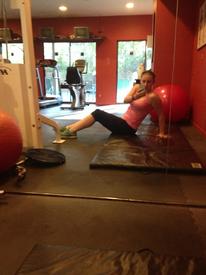Why everyone should use a heart rate monitor!

Nich0le
Posts: 2,906 Member
I have several family members that are also MFP members and I often see these great calories burned numbers entered with their (and my) exercise entries, and while it looks good, if following the MFP plan at all you may be getting too many exercise calories (if you eat them).
I just want to say that I worked hard this morning doing intervals on the treadmill and when entering any combo of exercises, walking at 4 and running at 5, intervals, average speed etc I had a calorie burn of anywhere from 450-700 calories, sounds great but then I checked my heart rate monitor and found that I only burned 263 calories.
Just saying, don't take the machines or MFP as gospel, and if you are having a hard time losing weight here this might be the problem. If you follow MFP and eat all of your exercise calories back you may be getting too many calories added back for the day.
I just want to say that I worked hard this morning doing intervals on the treadmill and when entering any combo of exercises, walking at 4 and running at 5, intervals, average speed etc I had a calorie burn of anywhere from 450-700 calories, sounds great but then I checked my heart rate monitor and found that I only burned 263 calories.
Just saying, don't take the machines or MFP as gospel, and if you are having a hard time losing weight here this might be the problem. If you follow MFP and eat all of your exercise calories back you may be getting too many calories added back for the day.
0
Replies
-
This is why I love my Polar F6. I trust its information.0
-
I love my Polar HRM too. My calories burned can vary sooo much day to day and workout to workout. Seeing how many calories I have (or have not) burned pushes me more. Intervals really bump up the calories. And Amazing how much I can burn in a Forrest yoga class with my favorite teacher.0
-
Yep. Everyone burns at a different tempo.0
-
yes! I love my Polar as well. When I do sprints it records MUCH different info than the machine does. SO helpful to get accurate readings.0
-
Excellent point! :flowerforyou:
I wasn't losing anything going by general calorie burn guidelines/data.
Borrowed a friend's HRM but went with a BodyBugg and I've found that my BodyBugg is even MORE accurate than a HRM. the Bugg :bigsmile:
the Bugg :bigsmile:
But whatever equipment you use, it is sooo much more accurate than the machine calorie count or database generalities!0 -
This is why I dont eat my exercise calories
 0
0 -
One question I always have to ask: how do you know the HRM is more accurate? Do you have any idea how they work?
I'm always curious when I routinely see such uncritical acceptance.0 -
It is also nice to get the calorie estimate from the same source each time. I'd think there is considerable variation even between two similar machines at the gym.0
-
Excellent point! :flowerforyou:
I wasn't losing anything going by general calorie burn guidelines/data.
Borrowed a friend's HRM but went with a BodyBugg and I've found that my BodyBugg is even MORE accurate than a HRM. the Bugg :bigsmile:
the Bugg :bigsmile:
But whatever equipment you use, it is sooo much more accurate than the machine calorie count or database generalities!
I'm a bugger too and find the data to be useful not to mention I love when I hit all my targets for the day and that little beep goes off 0
0 -
Normally the HRM is higher, so when doing my cardio I now take the # my HRM gives me and the # the machine gives me, take the difference divide it in half and add it to the lower of the two #'s
For instance
Machine 500
HRM 700
700-500=200/2=100
500(lowest #) + 100=6000 -
I think HRM's should be put in the Geneva Conventions that everybody must have one
hahaha0 -
One question I always have to ask: how do you know the HRM is more accurate? Do you have any idea how they work?
I'm always curious when I routinely see such uncritical acceptance.
Ahhh, I knew the devils advocate would be here eventually, hey azdak! For all I know HRM's will be found to be absolutely useless in 20 years but considering how they work I find it to be a useful gadget for the time being.
And yes, I know how they work, In simple terms....... the strap (used on most monitors) captures the electric signal the heart muscle gives when contracting. The transmitter in the strap then sends an electromagnetic signal containing the heart rate info to a receiver and then you can either see it on the display and most models now have an option to download the info to your computer.
The heart rate monitor is a small version of an electrocardiogram and has been useful in everything from stress tests to training elite atheletes and keeping "older" athlete's from pushing beyond their capacity to help avoid heart attacks in older athletes. I'd say all in all it is a pretty handy tool. 0
0 -
I have a timex HRM and I can tell you it is not that accurate. I will show 800-1200 calories burned during a typical P90X workout and I know that is too high even though I work out hard and am soaked in sweat. I enter half of what my HRM says as I would rather err on the side of caution. I also do not eat the extra calories but I don't sweat going over my 1800 cal if I worked out hard that day. Remember these tools are a guide so eat right, and get some good exercise.0
-
One question I always have to ask: how do you know the HRM is more accurate? Do you have any idea how they work?
I'm always curious when I routinely see such uncritical acceptance.
Ahhh, I knew the devils advocate would be here eventually, hey azdak! For all I know HRM's will be found to be absolutely useless in 20 years but considering how they work I find it to be a useful gadget for the time being.
And yes, I know how they work, In simple terms....... the strap (used on most monitors) captures the electric signal the heart muscle gives when contracting. The transmitter in the strap then sends an electromagnetic signal containing the heart rate info to a receiver and then you can either see it on the display and most models now have an option to download the info to your computer.
The heart rate monitor is a small version of an electrocardiogram and has been useful in everything from stress tests to training elite atheletes and keeping "older" athlete's from pushing beyond their capacity to help avoid heart attacks in older athletes. I'd say all in all it is a pretty handy tool.
Right, but how do we know that whatever formula the HRM is using to calculate calories is accurate and correct?0 -
Normally the HRM is higher, so when doing my cardio I now take the # my HRM gives me and the # the machine gives me, take the difference divide it in half and add it to the lower of the two #'s
For instance
Machine 500
HRM 700
700-500=200/2=100
500(lowest #) + 100=600
I think you are making your math more complicated than you need do. What you are doing here comes out to the same conclusion as if you just did a simple average. 500 + 700 = 1200 / 2 = 600.
With other numbers for example, your method:
Machine 400
HRM 900
900-400=500/2=250
400(lowest #) + 250=650
Average Method: 900 + 400 = 1300 / 2 = 6500 -
One question I always have to ask: how do you know the HRM is more accurate? Do you have any idea how they work?
I'm always curious when I routinely see such uncritical acceptance.
Ahhh, I knew the devils advocate would be here eventually, hey azdak! For all I know HRM's will be found to be absolutely useless in 20 years but considering how they work I find it to be a useful gadget for the time being.
And yes, I know how they work, In simple terms....... the strap (used on most monitors) captures the electric signal the heart muscle gives when contracting. The transmitter in the strap then sends an electromagnetic signal containing the heart rate info to a receiver and then you can either see it on the display and most models now have an option to download the info to your computer.
The heart rate monitor is a small version of an electrocardiogram and has been useful in everything from stress tests to training elite atheletes and keeping "older" athlete's from pushing beyond their capacity to help avoid heart attacks in older athletes. I'd say all in all it is a pretty handy tool.
Right, but how do we know that whatever formula the HRM is using to calculate calories is accurate and correct?
Well, considering electrocariograms have been in use for almost 100 years and are used for medical data collection with heart attack patients all the way to elite athletes to determine how fast your heart is pumping and we know that based on age and weight your target heart rate zone all give a basic mathematical equation that determines calories burned you can assume that for all intents and purposes that the HRM is going to be a better tool than the machines and general guesses on most websites. Age and weight most definitely play a huge part in how efficient our bodies are at burning calories. There are HRM in a variety of styles and prices and like most things out there the cheapest probably isn't the best bet and the most expensive is probably too much for the average person so if you are considering an HRM I would highly recommend doing some research to find the one that best fits your needs as well as your budget.And one with a strap is going to be more accurate than one without!
When it comes right down to it, my basic post was to state that the MFP calories burned should not be taken as gospel and if you are following the MFP plan and not losing weight you may want to consider that you may be getting more credit for your exercise than is deserved so use more than one tool to determine how many calories you are actually burning in a workout so that you can accurately determine how many exercise calories you could or should be eating.0 -
Also, as far as calories burned from MFP, you can go to three websites and enter the same info on all three and more than likely get three different answers so there is a flaw in the system somewhere.0
-
Also, as far as calories burned from MFP, you can go to three websites and enter the same info on all three and more than likely get three different answers so there is a flaw in the system somewhere.
This.0 -
based on age and weight your target heart rate zone all give a basic mathematical equation that determines calories burned
What is that equation? I have found calculators online, and even equations, but I don't know what's right or not.0 -
This is why I dont eat my exercise calories

Amen sister!0 -
Ok, here's an example:
Entered my age, weight and some ask for sex, because yes, women burn less calories than men in most cases because we should weigh less: Said I did one hour of running at 5mph
Mayoclinic.com 872
Caloriesperhour.com 871
MFP: 914
internetfitness.com 922
discoveryhealth.com 870
calorielab.com 763
if I didn't have a heart rate monitor I would choose the lowest to be on the safe side, not MFP because it might be falsley giving me an extra 151 calories or 1057 per week.0 -
based on age and weight your target heart rate zone all give a basic mathematical equation that determines calories burned
What is that equation? I have found calculators online, and even equations, but I don't know what's right or not.
women 226- your age = max heart rate men 220- age
This is for heart rate only, age and weight do have added factors to consider but basically if you want to lose weight you want to make sure to keep working at 60-70% of the max and elite athletes work at 90-100%.....maintenance is roughly 50-60% of max heart rate.
Also, and I don't have a polar, but polar guarantees the same accuracy in their HRM's as an electrocardiogram machine in the hospital or other medical facility.
sorry I don't have all the answers, or even the best, just wanted to open some eyes that trusting just MFP for calories burned may not be in your best interest. :happy:0 -
based on age and weight your target heart rate zone all give a basic mathematical equation that determines calories burned
What is that equation? I have found calculators online, and even equations, but I don't know what's right or not.
women 226- your age = max heart rate men 220- age
This is for heart rate only, age and weight do have added factors to consider but basically if you want to lose weight you want to make sure to keep working at 60-70% of the max and elite athletes work at 90-100%.....maintenance is roughly 50-60% of max heart rate.
Also, and I don't have a polar, but polar guarantees the same accuracy in their HRM's as an electrocardiogram machine in the hospital or other medical facility.
sorry I don't have all the answers, or even the best, just wanted to open some eyes that trusting just MFP for calories burned may not be in your best interest. :happy:
Does anyone know the equation for calculating calories burned from heart rate?0 -
based on age and weight your target heart rate zone all give a basic mathematical equation that determines calories burned
What is that equation? I have found calculators online, and even equations, but I don't know what's right or not.
women 226- your age = max heart rate men 220- age
This is for heart rate only, age and weight do have added factors to consider but basically if you want to lose weight you want to make sure to keep working at 60-70% of the max and elite athletes work at 90-100%.....maintenance is roughly 50-60% of max heart rate.
Also, and I don't have a polar, but polar guarantees the same accuracy in their HRM's as an electrocardiogram machine in the hospital or other medical facility.
sorry I don't have all the answers, or even the best, just wanted to open some eyes that trusting just MFP for calories burned may not be in your best interest. :happy:
I have to correct you on your assumption that 60%-70% of max HR is best for losing weight. The most up to date research indicates short spurts of intense sprint type exercise is by far superior in burning fat. You get better value out of a short workout that involves a warm up and the say 8 x 45 second HARD sprints with 90 seconds rest that an even paced easier workout for the same period of time. This is because of the influence on metabolism after exercise has finished. There are a number of reliable studies that back this up. Just google HIIT and see what is out there.
I can tell you from my experience as a marathon runner, I always look leaner and weigh less when I am NOT training for a marathon because I will do a HIIT workout 3 times a week rather than log the kilometers.
On the HRM v other methods of calculating calories burned, I don't think there is any 100% accurate method. There are other external factors that will influence your calorie expenditure that will not register via HRM such as climatic conditions.
Just my 2 cents worth.
Donna0 -
Robinator.........no offense here but you seem to have some very specific questions that you might want to do some research and find out. HRM are the most accurate devices at this time to learn how your own body is burning through each day, if I knew each equation I would build my own. If you are that curious about an exact equation you need to find a scientist that will be able to give and probably solve the equation for you. Instead of focusing on all these obscure questions try to take away the basic message I was sending out.......don't trust one source or MFP to be totally accurate when determining calories burned.....especially if you are eating your exercise calories back because as I stated you might be eating too many.
Donnam40...60-70% is still the goal for people just starting out but once they have built a little stamina HIIT or interval training does produce better results but thank you for the exact term HIIT, I will look this up and give it a try.
Also, it has been proven that two small workouts a day produce better results than one long one, but this is all off topic.0 -
There is no right or wrong when calorie estimations are concerned.based on age and weight your target heart rate zone all give a basic mathematical equation that determines calories burned
What is that equation? I have found calculators online, and even equations, but I don't know what's right or not.
Everything is an estimate, so don't sweat the fine details. You know that broiled chicken that you had the other day tha worked out to 200 calories? Well the probability of THAT piece of chicken really having exactly 200 calories is very close to 0. Why? The piece you ate may have had more or less fat than average. The scale you weighed it on might have only been accurate to the tenth of a pound. The bottom line is that you just don't know, so you count on the law of averages to make things right in the longer term.
Same with the HRM. Count on it giving you RELATIVE caloric expenditures, not absolute numbers. You may not have burned exactly 300 calories on the treadmill, but if the same monitor indicates that you burned 500 calories in an aerobics class in the same amount of time, then you know that the aerobics class burns more calories than the treadmill and might be a better bet to support your weight loss efforts.
Some HRMs may come REALLY close to your actual caloric expenditure, but even those might be off by a Bartlett pear, or a handful of baby carrots. Add to that the uncertainty in the calories you consume, and you can drive yourself crazy trying to figure out that last calorie.0 -
I believe that if you can stay within your calorie limits for that day and workout at lease 30 to 60 minutes per day, regardless of what you are using to show the amount of calories you burn, you will start to lose weight.
I try to eat my calorie limits, if I go over it is at the most 100 more calories that day and I usually try and workout for about an 1 hr. per day.
I try not to pay any attention to how many calories I burned that day because I don't know how accurate this can be.
How my clothes fit and the scale is my way of knowing if I am actually burning calories.0 -
Robinator.........no offense here but you seem to have some very specific questions that you might want to do some research and find out. HRM are the most accurate devices at this time to learn how your own body is burning through each day, if I knew each equation I would build my own. If you are that curious about an exact equation you need to find a scientist that will be able to give and probably solve the equation for you. Instead of focusing on all these obscure questions try to take away the basic message I was sending out.......don't trust one source or MFP to be totally accurate when determining calories burned.....especially if you are eating your exercise calories back because as I stated you might be eating too many.
Donnam40...60-70% is still the goal for people just starting out but once they have built a little stamina HIIT or interval training does produce better results but thank you for the exact term HIIT, I will look this up and give it a try.
Also, it has been proven that two small workouts a day produce better results than one long one, but this is all off topic.
Leaving aside the "no offense here but" portion of your message, I would like to let you know that my only intention in asking my "obscure questions" as you describe them is to try and determine for myself which HRM monitor works best for me. Please do not assume that a person is not capable of solving a certain equation. You are right that one source alone, or MFP alone, cannot be trusted to give exact numbers....thus why I am trying to do as much research and gather as much information as possible, so that I can make the most accurate determination of my calories burned. I know that your original post was only meant to help people, but please don't think that because someone asks follow-up questions that it means they either don't understand or don't give credence to what you had to say in the first place.0 -
robinator I would recommend Polar brand HRM's and garmin as a close second. Polar is well known to be considered the most accurate and for answers on those each website has a tool to help you determine which product offering is the best option for your needs. They will ask what sports or activities you are planning on using it for so you don't have to buy any unecessary options like GPS if you don't need it. The options can get quite pricey jumping from the $80-100 range up to $500. You can visit both websites at polar.com and garmin.com Also, consumer reports has tested several brands so you may want to look up that information but I do believe you have to join for a fee to access the information so another alternative is consumerresearch.com.0
This discussion has been closed.
Categories
- All Categories
- 1.4M Health, Wellness and Goals
- 398.4K Introduce Yourself
- 44.7K Getting Started
- 261K Health and Weight Loss
- 176.4K Food and Nutrition
- 47.7K Recipes
- 233K Fitness and Exercise
- 462 Sleep, Mindfulness and Overall Wellness
- 6.5K Goal: Maintaining Weight
- 8.7K Goal: Gaining Weight and Body Building
- 153.5K Motivation and Support
- 8.4K Challenges
- 1.4K Debate Club
- 96.5K Chit-Chat
- 2.6K Fun and Games
- 4.7K MyFitnessPal Information
- 17 News and Announcements
- 21 MyFitnessPal Academy
- 1.5K Feature Suggestions and Ideas
- 3.2K MyFitnessPal Tech Support Questions











